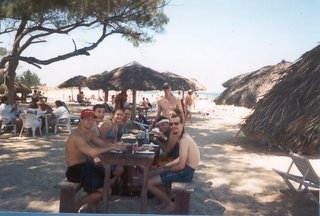Fariñas Ends Hunger Strike
Please check out Marc's post over at Uncommon Sense.
Here's wishing for Coco's speedy recovery, and a hope that his sacrifice wasn't in vain.
![[freedomtowernight_edited.jpg]](https://blogger.googleusercontent.com/img/b/R29vZ2xl/AVvXsEi-x7_mwi5EYyZJxpzNqsvkYATDseYTHIovP09YKrIctspB17DY_5s2AeackCCaZqX14NV-rcs5S81-anUoEkQcrbMqc9hATVpw0uU3hH1tyIbe0iq0Jfe5iTwGlJaoODZXAOt_Kg/s1600/freedomtowernight_edited.jpg)
Thoughts On a Wide Range of Topics Affecting South Florida and Elsewhere, From a Conservative Viewpoint


AN URGENT CALL FOR THE LIFE OF DOCTOR GUILLERMO FARIÑAS
IN CUBA
Information Bridge Cuba Miami and Net For Cuba
International send this alert stating that:
Psychologist and Director of Cubanacán Press Guillermo
Fariñas Hernandez began a hunger strike without fluids, in
the city of Santa Clara, Cuba, last January 31st, demanding
that the Cuban Government provide him with free access to
the Internet from his home. Up to now, the regime has
denied Dr. Fariñas' petition and he is about to die. We
appeal to the conscience of all people of goodwill who
receive this urgent call, so that a demand is addressed to
Fidel Castro to allow Dr. Fariñas to have free access to
the Internet. We don’t want another martyr for the liberty
and justice in Cuba! They add up to hundreds of thousands!
Enough is enough!
For the life of Dr. Guillermo Fariñas and his just claim,
address your communication to:
Fidel Castro Ruz
President of the Councils of State and Ministries
Havana, Cuba.
Fax: + 53 7 8333085(through the Ministry of the Exterior)
E-mail: f_castro@cuba.gov.cu
So much for a pleasant Sunday morning next to the pool. You can agree or disagree with the late Jorge Mas Canosa's opinions, but accusing him of "financing terrorism"? The lengths that some people will go to in order to smear those who disagree with them and promote their own agenda never ceases to amaze me.Re the March 16 article School named for exile Mas Canosa: Kudos to the Miami-Dade School Board for unanimously voting to name a new middle school after the late Jorge Mas Canosa.
Perhaps next door the district could build Luis Posada Carriles Elementary School: It is Posada through whom Mas Canosa is suspected to have financed terrorism inside Cuba.
Or how about Orlando Bosch Preschool? Bosch is, after all, a pediatrician who alongside Posada, has been implicated in the blowing up of a jet plane midair that killed more than 170 young athletes.
When Mas Canosa was at odds with The Miami Herald's news coverage of his business dealings and editorials that he deemed were not supportive of Cuban exile causes, the children of then-Publisher David Lawrence Jr. had to attend school surrounded by bodyguards. Feces were smeared on Lawrence's car.
School Board member Ana Rivas Logan succinctly stated in the article that Mas Canosa ``was many things to many people, not only in our community, but internationally.''
MAGDA MONTIEL DAVIS, Miami
Hypocrite doesn't begin to describe Montiel, but it's a start.
Now...what was I doing this morning?"They're (Cuban players) not interested in millions,'' Velez said. "We don't have prisoners. Simply, our athletes are besieged because people want to turn them into merchandise, but they want to play for their country.''It doesn't get much clearer than that, folks.

Desperate For FreedomOUR OPINION: CUBA IMPOSES AN INFORMATION BLOCKADE
The Cuban dissident Guillermo Fariñas is hungry to inform. To protest Cuba's cutting off his e-mail access, he has taken no food or water since Jan. 31. He has vowed not to resume eating until his e-mail is unblocked. The regime, meanwhile, shows no sign of easing up.
A psychologist turned independent journalist in a dictatorship that allows no free press, Mr. Fariñas directed the Cubanacán news agency from the city of Santa Clara. He sent uncensored accounts of human-rights abuses and other news via e-mail from an Internet café. That ended after he described to The Miami Herald a government-organized mob attack typical of the tightening squeeze on Cuban dissidents.
''I got on my knees and said, 'Down With Fidel!','' Mr. Fariñas was quoted in the front page of the newspaper. "They started kicking and beating me, bruising my back, arm and head. They stopped when they saw I would not lose my dignity and say things I didn't feel.''
The next day, his e-mail was blocked, and his hunger strike soon followed. Now he is being fed intravenously in a hospital and has lost more than 60 pounds.
Many people protest the Chinese government's Internet censorship, and with good reason. Freedom of information is a fundamental right. Cuba has been controlling Internet access and blocking websites for years and should be condemned, too. Indeed, Cuba's information blockade has allowed it to misinform the Cuban people, promote its image abroad and sustain its dictator in power for nearly five decades.
We do not condone Mr. Fariñas' hunger strike and hope he ends it before his health is damaged even more. But his voice should not be silenced by any government.
His courage under repression is admirable. Mr. Fariñas' desperation for freedom is yet another measure of Cuba's brutality.

